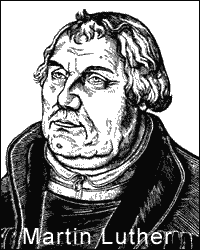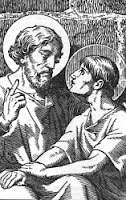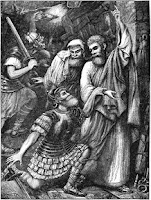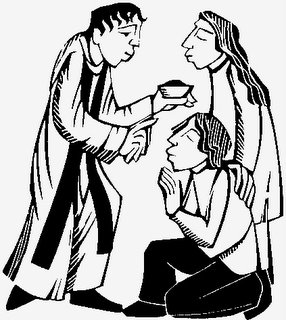 After the Ascension of Our Lord, Jesus' followers at Jerusalem chose Matthias to replace Judas: "And they cast lots for them, and the lot fell on Matthias, and he was numbered with the eleven apostles. (Acts 1:26)" Apart from the information given in the first chapter of Acts (vv. 12-26), we know nothing about him.
After the Ascension of Our Lord, Jesus' followers at Jerusalem chose Matthias to replace Judas: "And they cast lots for them, and the lot fell on Matthias, and he was numbered with the eleven apostles. (Acts 1:26)" Apart from the information given in the first chapter of Acts (vv. 12-26), we know nothing about him.One extra-biblical account says that Saint Matthias was slain by cannibals in Ethiopia; another traditions claims that he was stoned and then beheaded by Jews in Jerusalem. This account lends itself to his customary symbol in religious art: The sword from his beheading is superimposed over a book or scroll representing Holy Scripture.
Lection
Psalm 134
Isaiah 66:1-2
Acts 1:15-26
Matthew 11:25-30
Collect
Lord God, heavenly King, whose chose apostles have witnessed to us regarding Your resurrection, grant that Your Church, ever preserved from false teachers, may praise Your wonderful works and walk in the power of Your resurrection; for You live and reign with the Father and the Holy Spirit, one God, now and forever.
Technorati Tags: Saint Matthias | St. Matthias | Apostle Matthias | Matthias | Judas | apostle | martyr | martyrdom | Church Year | liturgical calendar | Christian | Lutheran | commemorations | biography | hagiography | historical theology | Church history
 Born around AD 69, Saint Polycarp was a central figure in the early church. Said to be disciple of the holy evangelist and apostle Saint John, he provides a link between the first generation of believers and later Christians, including Saint Irenaeus, Bishop of Lyons, who later wrote of him. Saint Ignatius of Antioch also knew and wrote to him. His home town of Smryna (modern Izmir, Turkey) was one of the seven churches addressed in Revelation (see 2:8-11 for the details).
Born around AD 69, Saint Polycarp was a central figure in the early church. Said to be disciple of the holy evangelist and apostle Saint John, he provides a link between the first generation of believers and later Christians, including Saint Irenaeus, Bishop of Lyons, who later wrote of him. Saint Ignatius of Antioch also knew and wrote to him. His home town of Smryna (modern Izmir, Turkey) was one of the seven churches addressed in Revelation (see 2:8-11 for the details).After serving for many years as bishop of Smyrna, Polycarp was caught up in a local persecution of Christians. While willing to be martyred, others encouraged him to flee. However, he was later arrested, tried, and executed for his faith on 23 February c. AD 156. An eyewitness narrative of his death, The Martyrdom of Polycarp, continues to encourage believers in times of persecution.
 According to the ancient records, he was tried solely on the charge of being a Christian. When the proconsul urged him to save his life by cursing Christ, he replied: "Eighty-six years I have served Him, and He never did me any wrong. How can I blaspheme my King who saved me?" According the the customary reckoning of his birth and death, this means that he must have been baptized as an infant, raised as a Christian, and lived his entire life as in the Faith. His fidelity follows the encouragement given by the Lord to the church in Smyrna in Revelation 2:10, "Be faithful unto death, and I will give you the crown of life. (ESV)"
According to the ancient records, he was tried solely on the charge of being a Christian. When the proconsul urged him to save his life by cursing Christ, he replied: "Eighty-six years I have served Him, and He never did me any wrong. How can I blaspheme my King who saved me?" According the the customary reckoning of his birth and death, this means that he must have been baptized as an infant, raised as a Christian, and lived his entire life as in the Faith. His fidelity follows the encouragement given by the Lord to the church in Smyrna in Revelation 2:10, "Be faithful unto death, and I will give you the crown of life. (ESV)"The following prayer is recorded as his immediately prior to the fire being kindled for his martyrdom: Lord God Almighty, Father of Your blessed and beloved Son Jesus Christ, through whom we have received knowledge of You, God of angels and hosts and all creation, and of the whole race of the upright who live in Your presence: I bless You that You have thought me worthy of this day and hour, to be numbered among the martyrs and share in the cup of Christ, for resurrection to eternal life, for soul and body in the incorruptibility of the Holy Spirit. Among them may I be accepted before You today, as a rich and acceptable sacrifice, just as You, the faithful and true God, have prepared and foreshown and brought about. For this reason and for all things I praise You, I bless You, I glorify You, through the eternal heavenly high priest Jesus Christ, Your beloved Son, through whom be glory to You, with Him and the Holy Spirit, now and for the ages to come. Amen.
Collect
O God, the maker of heaven and earth, who gave to Your venerable servant, the holy and gentle Polycarp, boldness to confess Jesus Christ as King and Savior, and steadfastness to die for the Faith, give us grace, following his example, to share the cup of Christ and rise to eternal life; through Jesus Christ our Lord, who lives and reigns with You and the Holy Spirit, one God, now and forever.
Technorati Tags: Polycarp | Saint Polycarp | St. Polycarp | Polycarp of Smyrna | Saint Polycarp of Smyrna | St. Polycarp of Smyrna | Smyrna | martyr | martyrdom | Saint John | Saint Irenaeus | Irenaeus of Lyons | Saint Ignatius | Ignatius of Antioch | Church Year | liturgical calendar | Christian | Lutheran | commemorations | biography | hagiography | historical theology | Church history | Aardvark Alley
 Martin Luther, born on 10 November 1483, in Eisleben, Germany, initially began studies leading toward a degree in law. However, after a close encounter with death, he switched to the study of theology, entered an Augustinian monastery, was ordained a priest in 1505, and received a doctorate in theology in 1512.
Martin Luther, born on 10 November 1483, in Eisleben, Germany, initially began studies leading toward a degree in law. However, after a close encounter with death, he switched to the study of theology, entered an Augustinian monastery, was ordained a priest in 1505, and received a doctorate in theology in 1512.As a professor at the newly-established University of Wittenberg, his Scriptural studies led him to question many of the church's teachings and practices, especially the selling of indulgences. His refusal to back down from his convictions resulted in his excommunication in 1521. Following a period of seclusion at the Wartburg castle, Luther returned to Wittenberg, where he spent the rest of his life preaching and teaching, translating the Scriptures, and writing hymns and numerous theological treatises.
We remember and honor his lifelong emphasis on the Biblical truth that for Christ's sake God declares us righteous by grace through faith alone. He died on 18 February 1546, while visiting the town of his birth.
Please visit Xrysostom for The Life of Martin Luther: A Chronology. A number of recommended books and web sites are included along with this biographical outline.
Lection
Psalm 46
Isaiah 55:6-11
Romans 10:5-17
John 15:1-11
Collect
O Lord God, heavenly Father, pour our Your Holy Spirit on Your faithful people, keep them steadfast in Your grace and truth, protect and comfort them in all temptation, defend them against all enemies of Your Word, and bestow on Christ's Church Militant Your saving peace; through Jesus Christ, Your Son, our Lord, who lives and reigns with You and the Holy Spirit, one God, now and forever.
Technorati Tags: Martin Luther | Doctor Martin Luther | Dr. Martin Luther | Lutheran | Lutheranism | Christianity | Reformation | Lutheran Reformation | Book of Concord | Church history | historical theology | hagiography | biography | theology | hymnody| Aardvark Alley
 Philipp Melanchthon, a brilliant student of the classics and a humanist scholar, was appointed to teach along with Martin Luther at the University of Wittenberg in 1518. At Luther's urging, Melanchthon began teaching theology and Scripture in addition to his courses in classical studies.
Philipp Melanchthon, a brilliant student of the classics and a humanist scholar, was appointed to teach along with Martin Luther at the University of Wittenberg in 1518. At Luther's urging, Melanchthon began teaching theology and Scripture in addition to his courses in classical studies.In April of 1530, Emperor Charles V called an official meeting between the representative of Lutheranism and Roman Catholicism, hoping to effect a meeting of minds between two opposing groups. Since Luther was at that time under papal excommunication and an imperial ban, Melanchthon was assigned the duty of being the chief Lutheran representative at this meeting. Thus, he made the primary verbal and written defenses of the Evangelical (Lutheran) position. We especially remembered and honored him as the author of the Augsburg Confession, which was officially presented by the German princes to the emperor on 25 June 1530, as the defining document of Lutheranism within Christendom.
Unfortunately, Melanchthon's desires for peace within Christendom led him to later rewrite and weaken some of the Augsburg Confession's language. The resulting Variata were palatable to some who disagreed with certain Lutheran teachings and allowed for false teaching to infiltrate Lutheranism. Ask the Pastor details some of this in a post on the Unaltered Augsburg Confession.
Lection
Psalm 46
Isaiah 55:6-11
Romans 10:5-17
John 15:1-11
Collect
O Lord God, heavenly Father, pour our Your Holy Spirit on Your faithful people, keep them steadfast in Your grace and truth, protect and comfort them in all temptation, defend them against all enemies of Your Word, and bestow on Christ's Church Militant Your saving peace; through Jesus Christ, Your Son, our Lord, who lives and reigns with You and the Holy Spirit, one God, now and forever.
Note: We commemorate Philipp Melanchthon's birth date because his death date often conflicts with Holy Week and Easter observances.
Technorati Tags: Philipp Melanchthon | Augsburg Confession | UAC | Unaltered Augsburg Confession | Formula of Concord | Diet of Augsburg | Lutheran | Reformation | Lutheran Reformation | Martin Luther | Book of Concord | Church history | historical theology | hagiography | biography
 Philemon was a prominent first-century Christian who owned a slave named Onesimus. While the name "Onesimus" means "useful," Onesimus proved himself "useless. (Philemon 11)" He ran away from his master and perhaps even stole from him (v. 18).
Philemon was a prominent first-century Christian who owned a slave named Onesimus. While the name "Onesimus" means "useful," Onesimus proved himself "useless. (Philemon 11)" He ran away from his master and perhaps even stole from him (v. 18).Somehow, Onesimus came into contact with the apostle Paul while the latter was in prison (possibly in Rome). Perhaps he knew that Paul and Philemon had a friendship and went to Paul in order to protect himself from harsh treatment should he be returned home. In any event, through Paul's proclamation of the Gospel he became a Christian. After Onesemus confessed to the apostle that he was a runaway slave, Paul directed him to return to his master and become "useful" again, as Paul had already determined him to be (v. 11).
 In order to help pave the way for Onesimus' peaceful return home, Paul sent him on his way with a letter addressed to Philemon, a letter in which he urged Philemon to forgive his slave for having run away and to "receive him as you would receive me (v. 17)" Paul encourged Philemon to think of Onesimus "no longer as a slave ... but as a beloved brother (v. 16)"
In order to help pave the way for Onesimus' peaceful return home, Paul sent him on his way with a letter addressed to Philemon, a letter in which he urged Philemon to forgive his slave for having run away and to "receive him as you would receive me (v. 17)" Paul encourged Philemon to think of Onesimus "no longer as a slave ... but as a beloved brother (v. 16)"The letter was eventually included by the church as one of the books of the New Testament.
Those looking to Scripture for a definitive statement on slavery find mixed messages in this brief epistle. While Paul seems to urge Philemon in the direction of treating Onesimus as a freedman, he certainly leaves open the option that Onesimus might be returning to slavery, albeit in a much-improved situation.
Technorati Tags: Philemon | Onesimus | Saint Paul | St. Paul | Apostle Paul | Paul | epistle | brotherhood | slave | slavery | freedom | Church Year | liturgical calendar | lectionary | Christianity | Christian | Lutheran | Lutheranism | Christian feasts | festivals | commemoration | theology | Christology | Holy Baptism | Baptism | sacraments | sacramental theology | historical theology | exegetical theology | Church history | Bible history | Bible | Scripture | Word of God | God's Word | New Testament| Acts
NB: Although Valentine was slain for the Faith, the color for Lent supersedes the martyr's red.
Some ancient accounts record a physician and priest living in Rome during the rule of the Emperor Claudius II. This Valentine become one of the noted martyrs of the third century. It seems that his main "crime" was joining couples in marriage. Specifically, Valentine married Roman soldiers. Evidently, Claudius thought that single men made better soldiers while Valentine and the Church resisted the immorality of less-permanent relationships.
The commemoration of his death, thought to have occurred during the year 270, became part of the calendar of remembrance in the early Western Church. Tradition suggests that on the day of his execution for his Christian faith, he left a note of encouragement for a child of his jailer. The note was written on an irregularly-shaped piece of paper which suggested the shape of a heart. This greeting became a pattern for millions of written expressions of love and caring that now are the highlight of Valentine's Day in many nations.
Lection
Psalm 95:1-7a
Ezekiel 18:1-9
1 Peter 4:12-19
John 2:1-11
Collect
Almighty and everlasting God, who kindled the flame of Your love in the heart of Your holy martyr Valentine, grant to us, Your humble servants, a like faith and power of love, that we who rejoice in his triumph may profit by his example; through Jesus Christ our Lord, who lives and reigns with You and the Holy Spirit, one God, now and forever.
Technorati Tags: Valentine | Saint Valentine | St. Valentine | Saint Valentine's Day | St. Valentine's Day | Valentine's Day | Claudius II | martyrdom | martyr | Church Year | liturgical calendar | sanctorial calendar | Christianity | Christian | Lutheran | Lutheranism | Christian feasts | festivals | saints' days | biography | hagiography | commemoration | theology | practical theology | hymnody | liturgics | hymnody | hymn | historical theology | history | Church history | Christian history | European history | Italian history | Roman history | Roman Empire
 Aquila and his wife Priscilla (Prisca) were Jewish contemporaries of Saint Paul. They traveled widely, perhaps in part for business reasons but later certainly because of unrest and persecution in Rome. They went to Corinth and met the apostle, who joined them for a time in the tent-making trade (Acts 18:1-3).
Aquila and his wife Priscilla (Prisca) were Jewish contemporaries of Saint Paul. They traveled widely, perhaps in part for business reasons but later certainly because of unrest and persecution in Rome. They went to Corinth and met the apostle, who joined them for a time in the tent-making trade (Acts 18:1-3).Priscilla and Aquila, in turn, teamed with Paul in his mission of proclaiming the Christian Gospel. The couple later traveled with him from Corinth to Ephesus (Acts 18:18), where the two of them established a home that served as hospitality headquarters for new converts to Christianity.
Apollos was one of their numerous Jewish pupils in the faith. Apollos was an eloquent man: "Being fervent in spirit, he spoke and taught accurately the things concerning Jesus. (Acts 18:25)" Apollos later traveled from Corinth to the province of Achaia, where he showed "by the Scriptures that the Christ was Jesus. (Acts 18:28)"
We especially remember these three for their great missionary zeal.
Technorati Tags: Aquila | Priscilla | Prisca | Apollos | Saint Paul | Acts | New Testament | Bible history | Church history| Christianity
 Paul chose Silas, a leader in the church at Jerusalem, to accompany him on his second missionary journey from Antioch to Asia Minor and Macedonia (Acts 15:40). Silas, also known as Silvanus, was imprisoned with Paul in Philippi (Acts 16:16-40) and experienced the riots in Thessalonica (Acts 17:1-9) and Berea (Acts 17:10-15).
Paul chose Silas, a leader in the church at Jerusalem, to accompany him on his second missionary journey from Antioch to Asia Minor and Macedonia (Acts 15:40). Silas, also known as Silvanus, was imprisoned with Paul in Philippi (Acts 16:16-40) and experienced the riots in Thessalonica (Acts 17:1-9) and Berea (Acts 17:10-15).They were apart for some length of time, after which he rejoined Paul in Corinth (Acts 18:1-5). Apparently, he remained there for an extended period.
One account stands out for most readers of the New Testament. The time Paul and Silas shared in the Philippian prison gave them a special opportunity to proclaim the Gospel. God freed their bonds during an earthquake but they refuse to escape and instead saved their jailer from committing suicide because of his responsibility for them. The Lord used these two and the surrounding events to witness to the jailer about His love and forgiveness through Christ Jesus. Working through the Gospel, the Holy Spirit brought him and his household to faith in Jesus and led them to be baptized.
Aside from these accounts, the Scriptures record little else about Silas and his relationship with Paul.
Technorati Tags: Saint Silas | Silas | St. Silas | Saint Paul | Acts | New Testament | Bible history | Church history| Christianity
The entire Christian life celebrates Christ's victorious Resurrection on Easter morning. However, from Christianity's earliest days, the actual Paschal season has received special emphasis. The Church has traditionally prepared for this, the greatest Feast of our Lord, through the season of Lent.
From ancient times, Ash Wednesday has marked the first day of Lent. There are forty days from Ash Wednesday until Easter. Sundays are not counted because the Sundays in Lent are not fast days; rather, each is a celebration of the Resurrection. The forty days of Lent are reminiscent of the forty days in which rain fell during the Flood, our Lord's forty days and Israel's forty years in the wilderness, Christ's forty hours in the tomb, and related periods of judgment, testing, and completion of divine activities. The Gospel readings of Lent focus on the temptation and trials that Christ underwent on his way to His suffering and crucifixion.
Many people observe Lent by fasting. This can take place in many ways: Physically, we may deny ourselves various foods and pleasures; liturgically, we may omit parts of the Divine Liturgy, such as Alleluias and songs of praise. The Fast increases in depth and seriousness as we move from Ash Wednesday to Holy Week. During the Sundays following Ash Wednesday, we follow our Savior as he puts himself "in harm's way" and prepares for his passion and death. As we continue through the Church Calendar, it is then during Holy Week that we fully focus on his suffering and death.
Along with fasting, two other traditional activities of the early Church remain part of many people's Lenten observance. These are increased prayer and almsgiving. All three of these are mentioned together in the Sermon on the Mount. A portion of this discourse in Matthew is the appointed Gospel in the three-year Lectionary cycle.
 Ash Wednesday receives its name from the ancient custom of rubbing oneself in ashes during a fast or period of penance as a sign of humility and sorrow. In Scripture, we observe this happening among people as varied as Job, the king of Ninevah and the rest of the city, Daniel, and Mordecai.
Ash Wednesday receives its name from the ancient custom of rubbing oneself in ashes during a fast or period of penance as a sign of humility and sorrow. In Scripture, we observe this happening among people as varied as Job, the king of Ninevah and the rest of the city, Daniel, and Mordecai.These days, most believers don't cover themselves in burlap and ashes; the ashes are placed on the foreheads of believers as their pastor says, "Remember that you are dust and to dust you shall return." The ashes remind us that we still daily sin and that all our grand and glorious deeds are nothing in God's sight. This is especially illustrated when the ashes are taken from the burning of the previous year's branches used on Palm Sunday. The praises of the people, their "Hosanna to the Son of David" and "Blessed is He who comes in the Name of the Lord," have fallen silent and are consigned to the burn pile of good intentions not followed through.
However we observe Lent, we must take care to not assume a false piety by focusing on self. The believer keeps Lent extra nos (outside of self), following the lead of Hebrews 12:2 and "looking to Jesus, the founder and perfecter of our faith, who for the joy that was set before him endured the cross, despising the shame, and is seated at the right hand of the throne of God."
Yes, Lent is a time of reflection and repentance. However, it's not intended to keep us looking within. Instead, upon viewing our sins, we then focus on the One who takes them away.
Along with readings and collect, I also include the Litany, a responsive prayer appropriate to days and seasons of penitence.
Lection
Psalm 51:1-13 (14-19)
Joel 2:12-19
2 Corinthians 5:20b-6:10
Matthew 6:1-6, 16-21
Collect
Almighty and everlasting God, You despise nothing You have made and forgive the sins of all who are penitent. Create in us new and contrite hearts that, lamenting our sins and acknowledging our wretchedness, we may receive from You full pardon and forgiveness; through Jesus Christ, Your Son, our Lord, who lives and reigns with You and the Holy Spirit, one God, now and forever.
Litany
God the Father, in heaven,
have mercy.
God the Son, Redeemer of the world,
have mercy.
God the Holy Spirit,
have mercy.
Be gracious to us.
Spare us, good Lord.
Be gracious to us.
Help us, good Lord.
By the mystery of Your holy Incarnation;
by Your holy Nativity;
by Your Baptism, fasting, and temptation;
by Your agony and bloody sweat;
by Your Cross and Passion;
by Your precious Death and Burial;
by Your glorious Resurrection and Ascension;
and by the coming of the Holy Spirit, the Comforter:
Help us, good Lord.
In all our time of tribulation;
in all our time of prosperity;
in the hour of death; and in the day of judgment:
Help us, good Lord.
We poor sinners implore You
to hear us, O Lord.
To prosper the preaching of Your Word;
to bless our prayer and meditation;
to strengthen and preserve us in the true faith;
to give heart to our sorrow and strength to our repentance:
We implore You to hear us, good Lord.
To draw us to Yourself;
to bless those who are instructed in the faith;
to watch over and console the poor, the sick, the distressed,
the lonely, the forsaken, the abandoned,
and all who stand in need of our prayers;
to give abundant blessing to all our works of mercy;
and to have mercy on us all:
We implore You to hear us, good Lord.
To turn our hearts to You;
to turn the hearts of our enemies, persecutors, and slanderers;
and graciously to hear our prayers:
We implore You to hear us, good Lord.
Lord Jesus Christ, Son of God,
we implore you to hear us.
Christ, the Lamb of God, who takes away the sin of the world,
have mercy.
Christ, the Lamb of God, who takes away the sin of the world,
have mercy.
Christ, the Lamb of God, who takes away the sin of the world,
grant us Your peace.
O Christ,
hear us.
O Lord,
have mercy.
O Christ,
have mercy.
O Lord, have mercy.
Amen.
Technorati Tags: Ash Wednesday | Lent | Easter | forty days | 40 days | penitence | ashes | imposition of ashes | penitential season | Lenten disciplines | prayer | fasting | almsgiving | charity | Church Year | liturgical calendar | lectionary | Christianity | Christian | Lutheran | Lutheranism | Christian feasts | festivals | theology | Law | Gospel | Law and Gospel
 Jacob was the third of the three great Hebrews given the title of patriarch, following his grandfather Abraham and his father Isaac. Jacob was the younger of the twin sons of Isaac and Rebekah.
Jacob was the third of the three great Hebrews given the title of patriarch, following his grandfather Abraham and his father Isaac. Jacob was the younger of the twin sons of Isaac and Rebekah.He received his name because before birth he gripped his brother Esau's heel, seeming even then to be struggling for supremacy (Jacob can mean "He grasps the heel" or "he cheats"). After wrestling with the Angel of the Lord, Jacob, who certainly had lived up to the name of "Deceiver," was renamed Israel, which means "he strives with God" (Genesis 25:26; 32:28).
His family life was filled with trouble, much of it caused by his acts of deception toward his father and his brother Esau and his parental favoritism toward his son Joseph (commemorated on 31 March). He spent many of his later years grieving over the death of his beloved wife Rachel and the presumed death of Joseph, who had been appointed by the Egyptian Pharaoh to be in charge of food distribution during a time of famine in the land.
Late in life, as he was blessing his sons, Jacob uttered God's prophetic promise that the Messiah would come through the line of his fourth son, Judah (Genesis 49:8-12).
Technorati Tags: Jacob | Isaac | Abraham | Esau | Jacob and Esau | Messianic prophecy
 The Presentation of Our Lord at the Temple, one of the Christological feasts of the Christian Church, is Scripture's final infancy narrative concerning Jesus. After the Presentation, the Bible says nothing more about Him until His twelfth year.
The Presentation of Our Lord at the Temple, one of the Christological feasts of the Christian Church, is Scripture's final infancy narrative concerning Jesus. After the Presentation, the Bible says nothing more about Him until His twelfth year.Some liturgical calendars name this the Feast of the Purification, emphasizing its Marian connection. Still another term used is Candlemas, drawing the name from the tradition of blessing the coming year's church candles on this day.
Saint Luke is the only one of the Evangelists to describe the event (see 2:22-40), something likely unfamiliar to most of his Gentile readers. According to the Gospel, Mary and Joseph took the Baby to the Temple in Jerusalem forty days after his birth to consecrate Jesus to God and to complete the ritual purification of Mary, both because of the command of God's Law (Exodus 13:1-2, 11-16; Leviticus 12).
Upon entering the temple, the family encountered the devout and holy Simeon. Luke records that he was promised that "he would not see death before he had seen the Lord's Christ. (Luke 2:26)" Simeon took Jesus into his arms, prayed the prayer that would become known as the Nunc Dimittis, or Canticle of Simeon, blessed the parents, and prophesied regarding Jesus and Mary.
The prophetess Anna (2:36-38) was also in the temple. She, too, offered prayers and praise to God for sending the Savior.
In the Western liturgical calendar, the Presentation of the Lord falls on 2 February because this is forty days after Christmas, the celebration of His birth. It is the last festival determined by the date of Christmas and thus shows that the Epiphany season is drawing to a close. Most churches in the East observe the occasion on 14 February since they celebrate Christ's Nativity on 6 January.
Lection
Psalm 84
1 Samuel 1:21-28
Hebrews 2:14-18
Luke 2:22-32 (33-40)
Collect
Almighty and ever-living God, as Your only-begotten Son was this day presented in the temple in the substance of our flesh, grant that we may be presented to You with pure and clean hearts; through Jesus Christ, our Lord, who lives and reigns with You and the Holy Spirit, one God, now and forever.
Technorati Tags: The Purification of Mary | The Presentation of Our Lord | Jesus | Christ | Jesus Christ | Virgin Mary | Simeon | Anna | Nunc Dimittis | Epiphany

